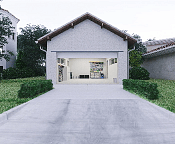Knowledge Hub
Knowledge Hub

How Home Renovations Affect Your Homeowner’s Insurance
Home and Leisure
December 14, 2022
The average person spends a significant portion of their life at home. In addition to working, we spend plenty of our waking hours sleeping, eating or relaxing within the confines of our homes. Naturally, you’d want to personalise this space as much as possible and update it to meet your family’s needs.
You want to make sure that the money you put towards improving your home and surroundings doesn’t go to waste — it helps to take steps to protect your investment. At DialDirect, we understand that your home renovations can impact your homeowner’s insurance or buildings insurance. This article will help you to find out how the changes to your home can impact this.
Does homeowner’s insurance cover DIY projects & renovations?
Yes, if you have a comprehensive homeowner’s insurance policy, you can rest assured that any accidents or incidents that occur during renovations will be covered — provided you’ve alerted your insurer to your intended work and increased your coverage limits to an appropriate scope and length.
In 2020, R406 billion[1] was spent on construction in South Africa, with residential building construction contributing 11% of that amount. It shows that, despite Covid-19 and other hiccups interrupting our lives, we’ve been investing in improving our living spaces.
When people want to upgrade their homes, they either undertake the renovations themselves or hire someone else to do them. Both options will benefit significantly from home insurance coverage. There are many ways you can upgrade your home that doesn’t require a professional’s assistance. For example, watching a few online tutorials and purchasing basic supplies from your hardware store can equip you to replace a worn-out door and hinges or caulk your ageing bathroom.
However, most people will leave major renovations to skilled professionals, such as adding new rooms or rewiring their homes. Even in this situation, insurance will play a role, as your contractor’s insurance can impact how well you’re covered should an accident or error occur during construction.
Can home insurance pay for DIY or renovations?
This is a yes and no answer. If your renovation results from a covered accident, like a damaged roof due to a hailstorm, then you will be covered by homeowner’s insurance. However, if you simply wish to remodel your kitchen because it’s outdated, then you will not be covered.
Remember that renovations undertaken to improve the aesthetics of your home that aren’t preceded by a destructive event won’t be covered by your homeowner’s insurance. This will only pay out if an unpreventable incident occurs on your property and causes damage. When this happens, you’ll need to make a claim, wait for it to be authorised and use an approved contractor to undertake the repair or rebuilding.
While the concept of home insurance is fairly self-explanatory, its coverage isn’t always so straightforward regarding DIY work. That’s why it’s a good idea to determine precisely what homeowner’s insurance does and doesn’t cover before requesting a home insurance quote or proceeding with a DIY project.
How renovations can increase your homeowner’s insurance
Improving your home's structure is a popular option. Not only does it transform your home into something better suited to your lifestyle, but it also increases its resale value. The pandemic forced many South Africans to re-evaluate their living space to create a more self-sufficient, multi-functional home. Some of the most popular renovations include:
-
Adding a home office
-
Updating the kitchen
-
Repurposing unused spaces
-
Adding smart features such as air filtration systems, security cameras or inverters to circumvent loadshedding.
Whichever option you go for, it will impact your homeowner’s insurance. Unlike other forms of insurance that you can ‘set and forget’, home insurance will change as your property does. It means that if you change its structure in any way, you’ll need to inform your insurer so that they can adjust your insurance coverage and premiums accordingly. While this might mean you pay a little extra every month, it also means that should your newly built pool spring a leak, it will be covered, allowing you to get back to swimming in next to no time.
While your homeowner’s insurance premiums are calculated according to your individual circumstances, you can expect your premiums to increase if you make certain additions to your home:
If you’re unsure what falls into this category, it’s anything that improves the curbside appeal of your home and is a permanent fixture on your property but doesn’t improve its functionality or make it safer to live in.
For example, adding a swimming pool will increase your property’s value and appeal, but it won’t help decrease the chances of damage or theft taking place on your property.
Similarly, adding a home office so that you can work online from home, or adding a granny flat for your ageing parents, or generally upgrading the look and fixtures of your house will all add to the value of your property, but it will increase your premium to cover your added investment.
Renovations that decrease your homeowner’s insurance
If your renovations lower the risk profile of your property, you might well find that your home insurance premiums decrease as a result.
Some renovations can decrease your premiums. These changes you make to your home increase its value and make it more secure or functional. Here are some examples:
-
Security features: this includes professionally installing boundary walls and electric fencing or adding cameras and exterior lighting.
-
Upgrading with gas, solar power and/or inverters: With loadshedding making electricity an unreliable source of power, installing gas appliances, solar panels and/or an inverter, you will provide your home with a backup power system that protects your home and your appliances and could lead to a reduction in your premiums.
-
Renovating your roof and insulating your home are also upgrades that lower risk while upgrading the overall value of your home.
Why you need to inform your insurer about renovations
When looking at all the costs you’re responsible for, home insurance can appear at the bottom of your list. This would be a mistake. Adjusting your premiums to reflect the value of your home accurately will ensure you don’t end up out of pocket should anything happen to your property, this can add up to thousands of rands. It’s just not worth the risk of being over- or under-insured!
Get a homeowner’s insurance quote from Dialdirect
Whether you’ve never insured your home or just haven’t upgraded the coverage in a while, DialDirect can assist you right now. Contact us today for an obligation-free homeowner's building insurance quote.
Sources:
[1] Stats SA: Construction industry, 2020
Disclaimer: The information in this article is provided for informational purposes only and should not be construed as financial, legal, or medical advice.

We have great insurance products
Need car, home & Life Insurance? We offer a wide range of insurance products. Switch & get cash back on insurance premiums.






















